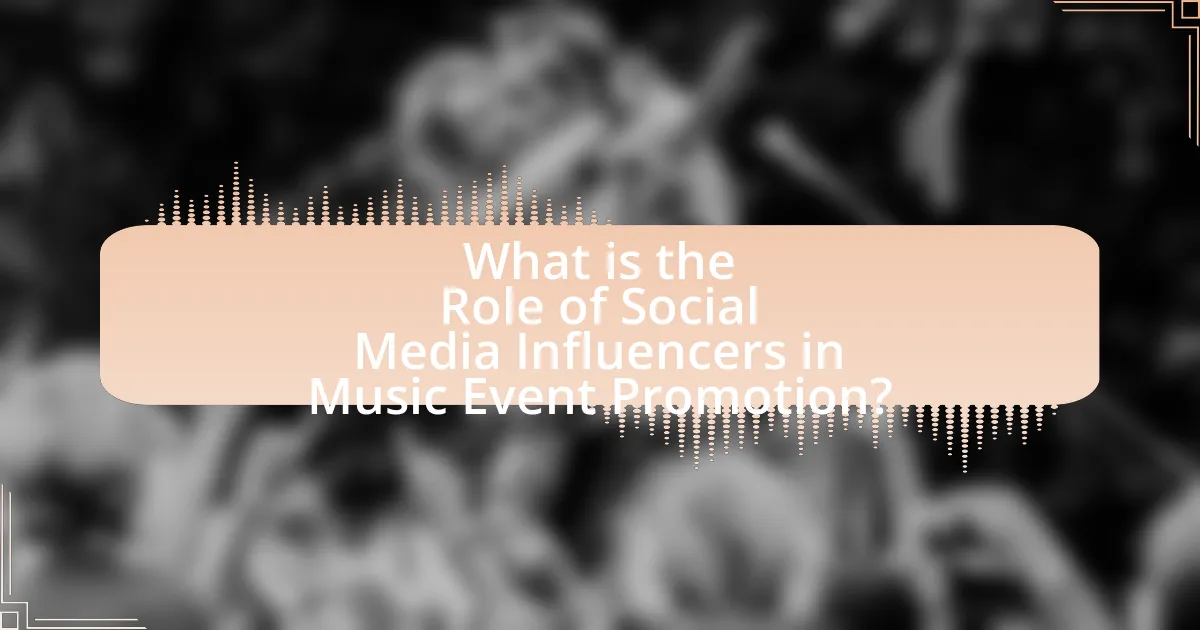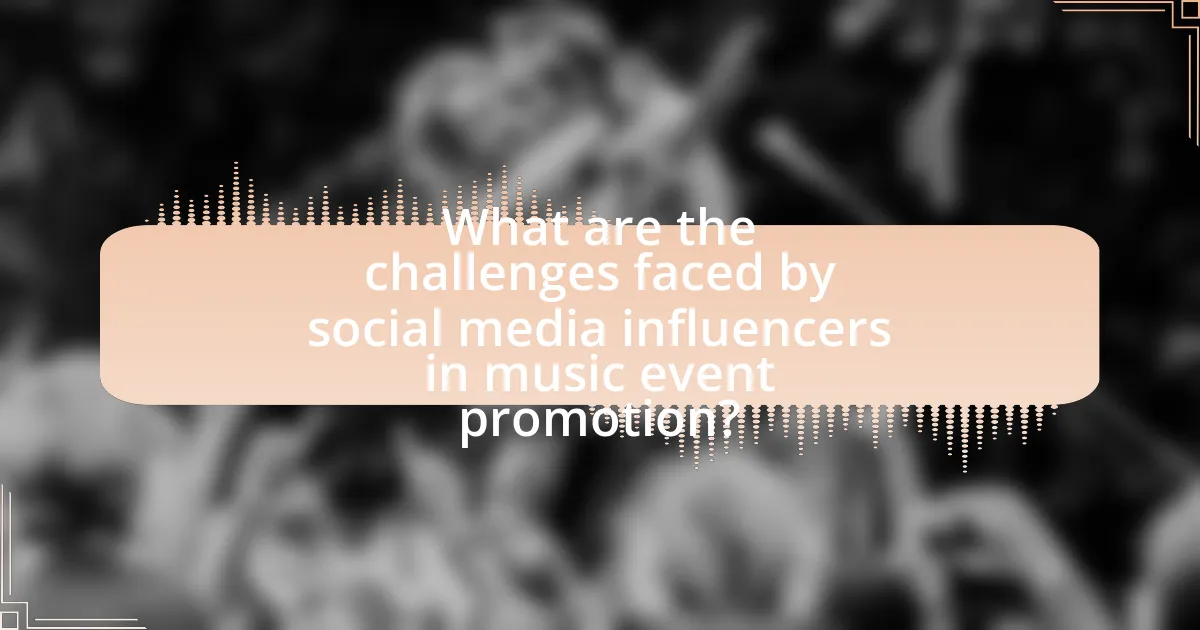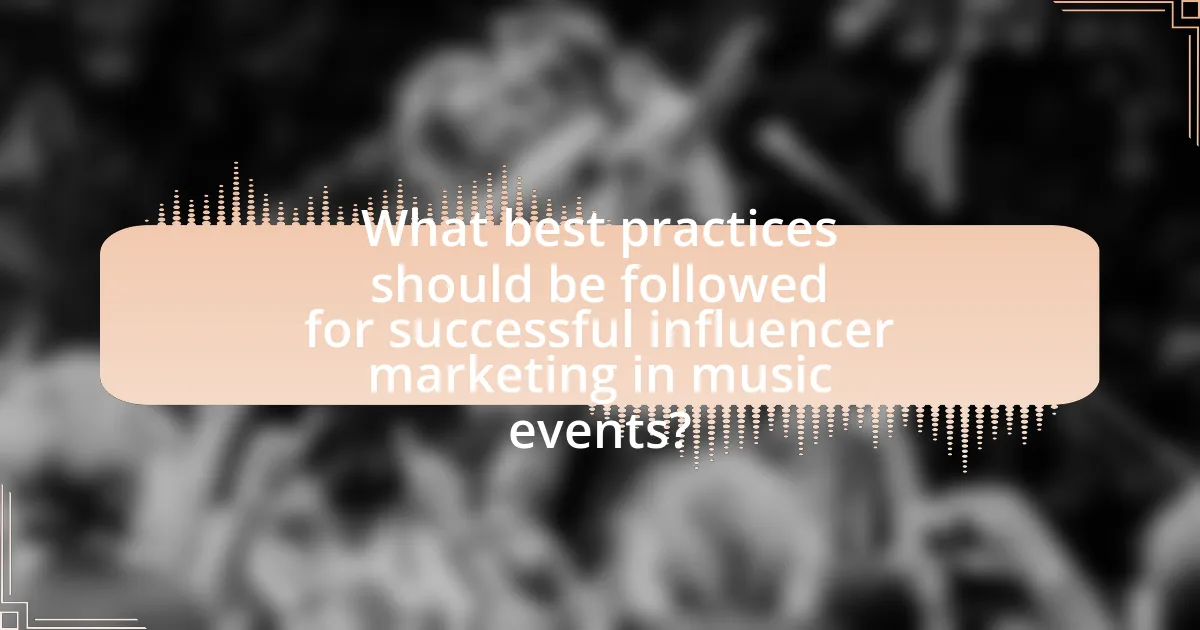Social media influencers play a pivotal role in the promotion of music events by utilizing their extensive followings on platforms such as Instagram, TikTok, and Twitter to enhance visibility and drive ticket sales. Their ability to create engaging content, including behind-the-scenes footage and artist interviews, significantly impacts audience engagement and event attendance. Studies indicate that events promoted by influencers can see attendance increases of up to 30%, highlighting the effectiveness of influencer marketing compared to traditional methods. Additionally, the article explores the characteristics of successful influencers, the challenges they face, and best practices for effective collaboration with event organizers, emphasizing the importance of authenticity and targeted strategies in maximizing promotional efforts.

What is the Role of Social Media Influencers in Music Event Promotion?
Social media influencers play a crucial role in music event promotion by leveraging their large followings to create buzz and drive ticket sales. They utilize platforms like Instagram, TikTok, and Twitter to share content related to the event, such as behind-the-scenes footage, artist interviews, and promotional posts, which can significantly increase visibility and engagement. For instance, a study by the Digital Marketing Institute found that 49% of consumers depend on influencer recommendations when making purchasing decisions, highlighting the effectiveness of influencers in reaching target audiences. Additionally, influencers often engage with their followers through interactive content, such as live streams and Q&A sessions, further enhancing audience connection and interest in the event.
How do social media influencers impact music event visibility?
Social media influencers significantly enhance music event visibility by leveraging their large followings to promote events to a broader audience. Their endorsements can lead to increased ticket sales and heightened awareness, as influencers often share content related to the event, such as behind-the-scenes footage, personal experiences, and promotional posts. For instance, a study by the University of Southern California found that events promoted by influencers saw a 30% increase in attendance compared to those without influencer involvement. This demonstrates that influencers not only reach potential attendees but also create a sense of authenticity and excitement around the event, further amplifying its visibility.
What platforms do influencers use to promote music events?
Influencers use platforms such as Instagram, TikTok, Facebook, and Twitter to promote music events. These platforms allow influencers to reach large audiences through visually engaging content, short videos, and real-time updates. For instance, Instagram’s Stories and Reels features enable influencers to share behind-the-scenes content and event highlights, while TikTok’s viral trends can generate significant buzz around upcoming events. According to a 2022 report by Hootsuite, 73% of marketers believe that social media is effective for event promotion, underscoring the importance of these platforms in reaching potential attendees.
How does influencer reach affect event attendance?
Influencer reach significantly impacts event attendance by increasing visibility and engagement among potential attendees. When influencers with large followings promote an event, they can effectively reach a broader audience, leading to higher ticket sales and participation rates. For instance, a study by the Digital Marketing Institute found that events promoted by influencers saw attendance rates increase by up to 30% compared to those without influencer involvement. This correlation highlights the importance of influencer reach in driving interest and attendance at music events.
Why are social media influencers important for music event marketing?
Social media influencers are important for music event marketing because they have the ability to reach and engage large audiences effectively. Their established trust and credibility with followers allow them to promote events in a way that resonates with potential attendees, leading to increased ticket sales and event visibility. For instance, a study by the Digital Marketing Institute found that 49% of consumers depend on influencer recommendations when making purchasing decisions, highlighting the significant impact influencers have on consumer behavior in the context of music events.
What advantages do influencers provide over traditional marketing methods?
Influencers provide targeted reach and authentic engagement that traditional marketing methods often lack. Unlike traditional advertising, which broadcasts messages to a broad audience, influencers connect with specific demographics, ensuring that promotional content resonates with their followers. For instance, a study by the Digital Marketing Institute found that 49% of consumers depend on influencer recommendations for their purchasing decisions, highlighting the effectiveness of influencer marketing in driving consumer behavior compared to traditional ads. Additionally, influencers foster a sense of community and trust, as their followers view them as relatable figures, which enhances brand loyalty and conversion rates.
How do influencers build trust and credibility with their audience?
Influencers build trust and credibility with their audience by consistently delivering authentic content and engaging transparently. Authenticity is established through genuine interactions, where influencers share personal experiences and insights, making their audience feel connected. Transparency is demonstrated by openly discussing partnerships and sponsorships, which fosters a sense of honesty. Research indicates that 92% of consumers trust recommendations from individuals over brands, highlighting the effectiveness of influencer marketing in establishing credibility. Additionally, influencers often engage with their audience through comments and direct messages, further solidifying their relationship and trustworthiness.
What types of influencers are most effective in music event promotion?
Micro-influencers and music influencers are the most effective types of influencers in music event promotion. Micro-influencers, typically having between 1,000 to 100,000 followers, often boast higher engagement rates and more authentic connections with their audience, leading to increased ticket sales and event visibility. Music influencers, who specialize in the music industry and have a dedicated following, can leverage their expertise and credibility to attract fans to events. According to a study by the Influencer Marketing Hub, campaigns involving micro-influencers can yield up to 60% higher engagement rates compared to those involving larger influencers, making them particularly valuable for promoting music events.
How do micro-influencers compare to macro-influencers in this context?
Micro-influencers typically have a more engaged audience compared to macro-influencers, making them particularly effective in promoting music events. Research indicates that micro-influencers, who usually have between 1,000 to 100,000 followers, achieve engagement rates of 3% to 10%, while macro-influencers, with over 100,000 followers, often see engagement rates drop to 1% to 3%. This higher engagement translates to more authentic interactions and a greater likelihood of influencing audience behavior, which is crucial for driving attendance to music events. Additionally, micro-influencers often have niche audiences that align closely with specific music genres, allowing for targeted promotions that resonate more deeply with potential attendees.
What characteristics define a successful music event influencer?
A successful music event influencer is characterized by strong audience engagement, authenticity, and a deep understanding of the music industry. Audience engagement is crucial as it allows the influencer to connect with followers, fostering a community that is more likely to attend events. Authenticity builds trust, making followers more receptive to the influencer’s recommendations. A deep understanding of the music industry enables the influencer to curate relevant content and effectively promote events, as evidenced by studies showing that influencers with industry knowledge have higher engagement rates.
How do social media influencers collaborate with event organizers?
Social media influencers collaborate with event organizers by promoting events through their platforms, leveraging their audience reach to enhance visibility and engagement. Influencers typically negotiate partnerships that may include sponsored posts, live coverage, and exclusive content creation related to the event. For instance, a study by the Digital Marketing Institute found that 49% of consumers depend on influencer recommendations when making purchasing decisions, highlighting the effectiveness of influencer marketing in driving attendance and interest in events. This collaboration often results in increased ticket sales and heightened brand awareness for both the event and the influencer.
What strategies can be employed for effective influencer partnerships?
Effective influencer partnerships can be achieved through targeted selection, clear communication, and mutual value creation. Targeted selection involves identifying influencers whose audience aligns with the event’s demographic, ensuring relevance and engagement. Clear communication establishes expectations, goals, and deliverables, fostering a collaborative environment. Mutual value creation ensures that both the influencer and the event benefit, such as through exclusive content, giveaways, or unique experiences that resonate with the influencer’s followers. Research indicates that campaigns with well-aligned influencers can yield up to 11 times the ROI compared to traditional advertising methods, highlighting the importance of strategic partnerships in maximizing promotional effectiveness.

What are the challenges faced by social media influencers in music event promotion?
Social media influencers face several challenges in music event promotion, including audience engagement, algorithm changes, and competition saturation. Engaging audiences effectively is difficult due to the diverse preferences of followers, which can lead to lower interaction rates. Additionally, frequent changes in social media algorithms can limit the visibility of promotional content, making it harder for influencers to reach their target audience. Furthermore, the market is saturated with influencers, leading to increased competition for attention and collaboration opportunities, which can dilute the effectiveness of promotional efforts. These challenges necessitate strategic planning and adaptability for successful music event promotion.
What common pitfalls should influencers avoid when promoting events?
Influencers should avoid misleading their audience about event details, as this can damage their credibility and trust. Misrepresentation includes exaggerating the event’s significance, miscommunicating the date or location, or failing to disclose sponsorships. According to a study by the Digital Marketing Institute, 61% of consumers are less likely to trust influencers who provide inaccurate information. Additionally, influencers should refrain from over-promoting events, which can lead to audience fatigue and disengagement. A balanced approach, focusing on genuine engagement and authentic content, is essential for maintaining a positive relationship with followers.
How can influencers manage negative feedback or backlash?
Influencers can manage negative feedback or backlash by actively engaging with their audience and addressing concerns directly. This involves acknowledging the feedback, responding thoughtfully, and providing clarifications or solutions when necessary. Research indicates that transparent communication can enhance trust and mitigate damage to an influencer’s reputation. For instance, a study by the Pew Research Center found that 70% of social media users appreciate when influencers respond to criticism, as it demonstrates accountability and fosters a sense of community. By maintaining a calm and professional demeanor, influencers can turn negative situations into opportunities for growth and connection with their followers.
What legal considerations must influencers be aware of?
Influencers must be aware of several legal considerations, including disclosure requirements, copyright laws, and contract obligations. Disclosure requirements mandate that influencers clearly indicate when content is sponsored or includes affiliate links, as outlined by the Federal Trade Commission (FTC) guidelines. Copyright laws protect the intellectual property of creators, meaning influencers must obtain permission to use music, images, or videos that are not their own. Additionally, influencers should adhere to contract obligations with brands, ensuring they fulfill the terms agreed upon, which may include specific content deliverables and timelines. These legal considerations are crucial for maintaining compliance and avoiding potential legal disputes.
How do influencers measure the success of their promotional efforts?
Influencers measure the success of their promotional efforts primarily through metrics such as engagement rates, reach, and conversion rates. Engagement rates, which include likes, comments, and shares, indicate how well the audience interacts with the content. Reach measures the total number of unique users who see the promotional posts, providing insight into the visibility of the campaign. Conversion rates track the number of users who take a desired action, such as purchasing tickets or signing up for newsletters, directly linked to the promotional efforts. These metrics are often analyzed using analytics tools provided by social media platforms, which offer detailed insights into audience behavior and campaign performance.
What metrics are most relevant for evaluating influencer impact?
The most relevant metrics for evaluating influencer impact include engagement rate, reach, impressions, and conversion rate. Engagement rate measures the level of interaction (likes, comments, shares) relative to the follower count, indicating how effectively an influencer connects with their audience. Reach quantifies the total number of unique users who see the content, while impressions count the total views, providing insight into visibility. Conversion rate tracks the percentage of users who take a desired action, such as purchasing tickets or signing up for newsletters, demonstrating the influencer’s effectiveness in driving tangible results. These metrics collectively provide a comprehensive view of an influencer’s impact on music event promotion.
How can influencers adapt their strategies based on performance data?
Influencers can adapt their strategies based on performance data by analyzing metrics such as engagement rates, audience demographics, and content reach. By closely monitoring these metrics, influencers can identify which types of content resonate most with their audience, allowing them to refine their messaging and posting frequency. For instance, if data shows that video content generates higher engagement than static posts, influencers can prioritize video creation. Additionally, performance data can reveal optimal posting times and platforms, enabling influencers to maximize visibility and interaction. This data-driven approach is supported by studies indicating that targeted content strategies can increase engagement by up to 50%, demonstrating the effectiveness of adapting based on performance insights.

What best practices should be followed for successful influencer marketing in music events?
Successful influencer marketing in music events requires strategic selection of influencers, authentic engagement, and measurable outcomes. First, brands should choose influencers whose audience aligns with the event’s target demographic, ensuring relevance and maximizing reach. For instance, a study by Influencer Marketing Hub indicates that 63% of marketers believe that selecting the right influencer is crucial for campaign success.
Next, fostering genuine relationships with influencers enhances authenticity, as audiences are more likely to trust recommendations from influencers they perceive as relatable. According to a survey by Edelman, 63% of consumers trust influencers more than brand advertisements.
Finally, establishing clear metrics for success, such as engagement rates and ticket sales, allows for the assessment of the campaign’s effectiveness. Research from the Digital Marketing Institute shows that 49% of marketers measure influencer marketing success through engagement metrics, highlighting the importance of data-driven strategies.
How can event organizers effectively select the right influencers?
Event organizers can effectively select the right influencers by analyzing their audience demographics, engagement rates, and relevance to the event’s theme. By ensuring that the influencer’s followers align with the target audience of the event, organizers can maximize reach and impact. For instance, a study by Influencer Marketing Hub found that 63% of marketers believe that audience engagement is more important than follower count when selecting influencers. This highlights the necessity of focusing on influencers who not only have a substantial following but also foster genuine interactions with their audience. Additionally, reviewing past collaborations and the influencer’s content style can provide insights into their suitability for promoting the event.
What criteria should be considered when choosing influencers for an event?
When choosing influencers for an event, key criteria include audience alignment, engagement rates, content quality, and relevance to the event’s theme. Audience alignment ensures that the influencer’s followers match the target demographic of the event, which is crucial for effective promotion. Engagement rates, measured by likes, comments, and shares, indicate how actively the influencer interacts with their audience, reflecting their influence and reach. Content quality assesses the aesthetic and messaging of the influencer’s posts, ensuring they resonate with the event’s branding. Relevance to the event’s theme guarantees that the influencer’s style and interests align with the event’s purpose, enhancing authenticity and appeal. These criteria collectively enhance the likelihood of successful event promotion through influencer partnerships.
How can alignment of brand values enhance collaboration?
Alignment of brand values enhances collaboration by fostering trust and shared objectives among partners. When brands share similar values, they create a cohesive narrative that resonates with their audiences, leading to more effective communication and collaboration. For instance, a study by the Harvard Business Review found that companies with aligned values experience 30% higher employee engagement, which translates to more productive partnerships. This alignment not only streamlines decision-making processes but also enhances the authenticity of joint marketing efforts, making campaigns more relatable and impactful to the target audience.
What tips can influencers use to maximize their promotional efforts?
Influencers can maximize their promotional efforts by leveraging authentic engagement with their audience. Building genuine relationships fosters trust, which enhances the effectiveness of promotional content. For instance, a study by the Digital Marketing Institute found that 70% of millennials are influenced by the recommendations of their peers, highlighting the importance of authenticity in influencer marketing. Additionally, influencers should utilize analytics tools to track engagement metrics, allowing them to refine their strategies based on what resonates most with their audience. This data-driven approach ensures that promotional efforts are targeted and effective, ultimately leading to higher conversion rates for music events.
How can influencers create engaging content that resonates with their audience?
Influencers can create engaging content that resonates with their audience by understanding their audience’s preferences and interests, and tailoring their content accordingly. This involves conducting audience research to identify key demographics, interests, and pain points, which allows influencers to craft messages that are relevant and relatable. For instance, a study by the Digital Marketing Institute found that 70% of consumers feel more connected to brands when the content is personalized to their interests. Additionally, using storytelling techniques and authentic experiences can enhance engagement, as audiences are more likely to connect with genuine narratives. Influencers should also leverage interactive formats, such as polls or Q&A sessions, to foster two-way communication, further increasing audience involvement and satisfaction.
What role does authenticity play in influencer marketing for music events?
Authenticity is crucial in influencer marketing for music events as it fosters trust and engagement between influencers and their audience. When influencers genuinely connect with the music and the event, their endorsements resonate more with followers, leading to higher ticket sales and increased event visibility. Research indicates that 86% of consumers consider authenticity important when deciding which brands to support, highlighting that authentic influencers can significantly impact consumer behavior in the music industry.